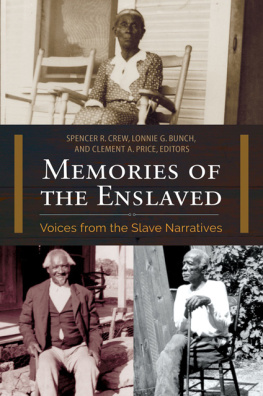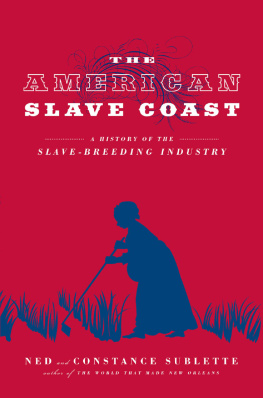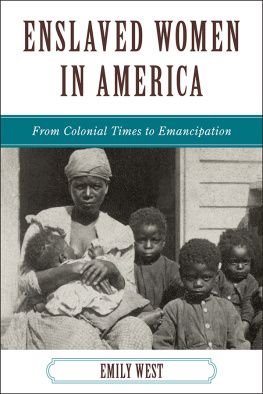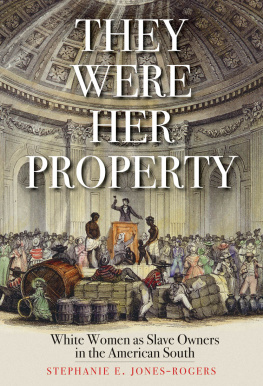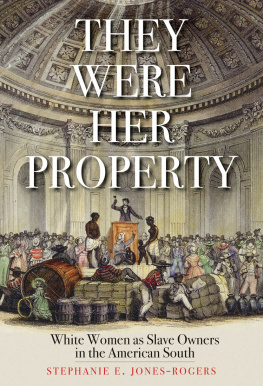2020 The University of North Carolina Press
All rights reserved
Set in Merope Basic by Westchester Publishing Services
Manufactured in the United States of America
The University of North Carolina Press has been a member of the Green Press Initiative since 2003.
Library of Congress Cataloging-in-Publication Data
Names: Finley, Alexandra J., author.
Title: An intimate economy : enslaved women, work, and Americas domestic slave trade / Alexandra J. Finley.
Description: Chapel Hill : The University of North Carolina Press, 2020. | Includes bibliographical references and index.
Identifiers: LCCN 2019052078 | ISBN 9781469655116 (cloth) | ISB N 9781469661353 (pbk.) | ISBN 9781469655123 (ebook)
Subjects: LCSH : Slave tradeUnited StatesHistory. | SlaveryEconomic aspectsUnited States. | Women slaves EmploymentUnited StatesHistory. | WomenEmployment United StatesHistory. | SlaveryUnited StatesHistory.
Classification: LCC E 442 . F 56 2020 | DDC 306.3/620973dc23
LC record available at https://lccn.loc.gov/2019052078
Cover illustrations: Background , detail of Silas Omohundro Market and General Account Book (courtesy of Library of Virginia); label tag , iStock.com/artisteer; portrait , detail of A Quadroon (courtesy of the Historic New Orleans Collection, The L. Kemper and Leila Moore Williams Founders Collection, 1965.90.281.8).
Acknowledgments
In a project that stresses the importance of domestic and socially reproductive labor, it is only appropriate that I thank the friends, family, and acquaintances who opened their literal and metaphorical homes to me while I researched and wrote.
In terms of academic homes, I couldnt have found a better place to grow up than William & Mary, and I thank all of the colleagues and mentors who helped raise me and guide me into the scholar I am today. I cannot thank Scott Nelson and Cindy Hahamovitch enough for their encouragement, brilliant insights, and spirit of generosity as mentors and friends. Karin Wulf has been a constant source of guidance and support throughout my career and I count myself lucky to know her. Jim and Carolyn Whittenburg inspired my love of history and William & Mary many years ago, and thus began my life as a historian. Sarah E. Thomas has provided amazing support for this project, and her encouragement, editing, and friendship have made the book what it is today. Laura Ansley has been with this work from the beginning and I thank her for her feedback throughout the projects life and, most importantly, for her friendship. Thank you to Hannah Bailey, Laurel Daen, Cara Elliott, and Casey Schmitt for being exemplary peers and friends. To Fred Corney, Andrew Fisher, Paul Mapp, Leisa Meyer, Hannah Rosen, Brett Rushforth, Carol Sheriff, and everyone I knew in Williamsburg, I say thank you.
Several institutions supported this project, giving me temporary intellectual homes in which to research and write. I received a Parker-Dooley Visiting Scholar Grant from the Southern Historical Collection at the University of North Carolina at Chapel Hill and a Betty Sams Christian Fellowship from the Virginia Historical Society. I owe a special thanks to John McClure at the Virginia Historical Society. The wonderful staff at the Library of Virginia have made researching a delight and gave me the opportunity to partake in the To Be Sold exhibit and conference in 2015. Particular thanks are due to Barbara Batson, Gregg Kimball, and Brent Tarter. My other archival home, the City Archives/Louisiana Division at the New Orleans Public Library, provided an endless treasure trove of materials, and I thank Greg Osborn and all the archivists there for helping me locate seemingly endless case files. Much of my early writing was done during a fellowship year at the McNeil Center for Early American Studies at the University of Pennsylvania. Thank you to Dan Richter and my entire cohort for your stimulating conversation and sociability during an otherwise solitary process. Many thanks are due to all of my amazing colleagues at my current academic home, the University of Pittsburgh, who have been incredibly welcoming and supportive of me and my research.
I have been lucky enough to research, attend conferences, and teach alongside many amazing historians. This project owes a great deal to Joshua Rothman and Calvin Schermerhorn, both of whom provided thoughtful feedback on the manuscript at several stages of writing. Their suggestions have strengthened my analysis and pushed the work forward. Robert Colby, Maria Montalvo, Seth Rockman, and Calvin Schermerhorn have all generously exchanged both materials and ideas with me, and my work would not be the same without their assistance. The intellectual support of Daina Ramey Berry, Laura Edwards, Henry Louis Gates Jr., Ellen Hartigan-OConnor, and Stephanie Jones-Rogers has made this book what it is and I thank them for their input. A conversation with Justin Randolph about the adventures of archival research in court houses inspired the epilogue of this book. I am grateful to have received encouragement and insight from Mandy Cooper, Max Degenais, Rachel Engle, Jill Found, Sarah Gronningsater, Erin Holmes, Andrew F. Lang, Peter Messer, Julia Osman, Judith Ridner, Morgan Robinson, Courtney Thompson, and others who Im sure I will remember as soon as this goes into print.
Thank you to Mary Caviness, Charles Grench, Jessica Newman, Dylan White, and everyone at UNC Press. Particular thanks go to Chuck Grench, who has believed in this project from the beginning. I appreciate the ways in which he has shaped this book, and I have valued our many conversations. I thank him for all his encouragement and his willingness to listen.
The Omohundro descendants with whom Ive corresponded have been welcoming, open, and generous. Rene Tyree has been particularly helpful, and I thank her for her kindness and for sending me copies of the images of the Omohundros used in this book.
To my family, whose many forms of labor allowed me to do everything I do today, how can I say thank you? Besides housing, clothing, and feeding me from my birth to age eighteen, my parents, Joe and Deb Finley, also taught me courage, compassion, and the strength in being kind. For the many meals cooked, floors swept, illnesses nursed, and dreams inspired, I say thank you. My grandpa, Roger Minerd, has supported and eagerly awaited this work for what must seem like forever. I thank him for believing in me and inspiring me to speak my mind.
My grandma, to whom this book is dedicated, didnt live to see its publication, or even to see me become a historian. I hope she knows that her memory keeps me searching for human stories and putting words on the page. Mary Ann Kees belief in my writing set me on the path that Im on today, however circuitous the route. Her selflessness, her creative spirit, and her open heart inspire me to be a better person.
The socially reproductive labor of raising a child extends beyond the immediate family, and I want to acknowledge all of those family friends, extended family members, and public-school teachers who have mentored me over the years. Thank you for your support, your belief in me, and your role in shaping me into who I am today.


